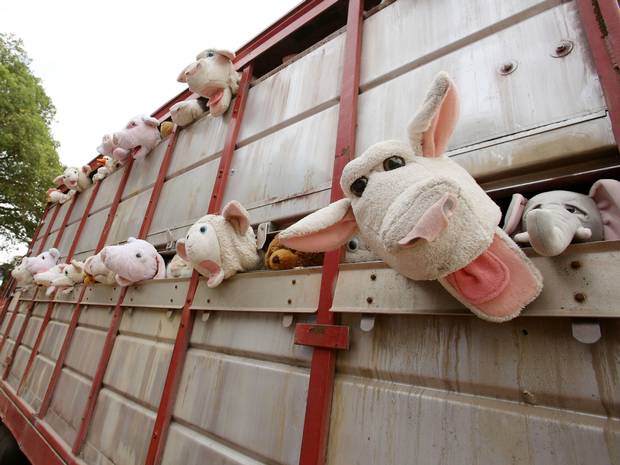
Glastonbury is over for another year. For many the mixture of mud, music, revellers and a peculiarly English charm gives it it’s attraction. But this year has been mired in controversy over Metallica who headlined the Pyramid stage on Saturday. The band’s lead singer was recently filmed posing with a bear he had shot.
Emily Eavis, whose father Michael owns Worthy Farm where the festival takes place said: “We don’t get involved in other people’s politics”, claiming it would mean all but a handful of performers would be acceptable.
This year also saw a moving sculpture depicting a truck full of shrieking cuddly animals being taken to slaughter, called Sirens of the Lambs, by Banksy, highlighting the issue of animals being farmed for their meat.
The Independent revealed that “baffled music fans looked on as the vehicle was seen travelling across the fields of Worthy Farm”, while Michael Eavis said: “Is it some kind of animal rights thing? Our cows are actually very happy, they have the highest milk yield in the county.”
Being a dairy farmer, Eavis doesn’t get it. His cows certainly aren’t happy as their calves are torn from them at a few hours old so he can sell their milk at a profit. Last year he also said he was a supporter of the badger cull.
Glastonbury grew out of the hippy counterculture of the sixties and at the early festivals all the food was vegetarian. Nowadays there is a Green Field where most of the stalls still are but in the other parts of the event you’ll find as much meat and other animal products as anywhere else.
Animal rights simply isn’t an issue but that isn’t all that’s changed. Until the nineties it was still an alternative to other festivals with a different ethos but in the past 20 years it has become steadily more mainstream. This is due in part to television coverage which made it so popular that security measures couldn’t cope with the influx of revellers.
In 2002 the Mean Fiddler was brought in to organise the logistics and security and the corporate takeover of Glastonbury was complete. Ticket prices are now so high that a lot of people can’t afford them, including many new age travellers who had been going since the Stonehenge festival was banned in 1985.
Politics now plays a minor part in the festival. There’s a Left Field but it’s merely a sideshow to the main event and attracts small numbers of people. It’s run by the has-been Billy Bragg who owns a big house in Dorset and who voted for the Lib Dems at the last election.
Meanwhile Emily Eavis’ name has appeared on a list of guests expected to attend David Cameron’s next “cool Britannia” Downing Street party. This “will celebrate the best of Britain’s creative talent and is also designed to recruit Tory backers before next year’s Election”, according to the Independent.
This year Iron Maiden singer Bruce Dickinson vowed never to bring his band to the event after dismissing it as “the most bourgeois thing on the planet.” He stated: “In the days when Glasto was an alternative festival it was quite interesting, but anywhere Gwyneth Paltrow goes and you can live in an air-conditioned yurt is not for me.”
The truth is that Glastonbury can only reflect society itself. 30 or 40 years ago the counterculture was seen as a threat by mainstream society. But as often happens it has been thoroughly assimilated into capitalism and is now toothless. It may be a good weekend out if you like bands, band weather and getting off your head but no-one believes anymore that it can change the world.
It certainly did used to be more of a countercultral festival, but having a pop at it for being run by a dairy farmer is a bit rich. That’s always been the case and at the first one punters got free milk!
Conversely, there were always loads of bands that were unpolitical and/or had done iffy political things on the bill.
It was the very fact that it could be got into for free that undid it. The initial big fence was pulled down a couple of times, and even when it wasn’t security used to help you over. But by the late 90s there were as many bunkers-in as paying punters, it was overfilled, unsafe, and full of gangs of twats robbing people. What do you suggest they should’ve done?
The price, for five days, compares well with other large events, but even if you can’t save up for that over the year there is a huge proportion of tickets for workers of various kinds, so you can litter pick or pull pints to get in.
A colossal amount of space is devoted to uncommercial stuff, the sponsorship is reined tightly in (at Reading all those satin flags would be advertising beer and soft drinks!), and it is a huge opportunity for campaigns to do outreach and fundraising, as hundreds of them do. No other major festival does that.